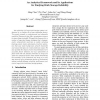Free Online Productivity Tools
i2Speak
i2Symbol
i2OCR
iTex2Img
iWeb2Print
iWeb2Shot
i2Type
iPdf2Split
iPdf2Merge
i2Bopomofo
i2Arabic
i2Style
i2Image
i2PDF
iLatex2Rtf
Sci2ools
SRDS
2007
IEEE
2007
IEEE
An Analytical Framework and Its Applications for Studying Brick Storage Reliability
The reliability of a large-scale storage system is influenced by a complex set of inter-dependent factors. This paper presents a comprehensive and extensible analytical framework that offers quantitative answers to many design tradeoffs. We apply the framework to a number of important design strategies that a designer and/or administrator must face in reality, including topology-aware replica placement, proactive replication that uses small background network bandwidth and unused disk space to create additional copies. We also quantify the impact of slow (but potentially more accurate) failure detection and lazy replacement of failed disks. We use detailed simulation to verify and refine our analytical model. These results demonstrate the versatility of the framework and serve as a solid step towards more quantitative studies of fundamental system tradeoffs between reliability, performance, and cost in large-scale distributed storage systems.
| Added | 04 Jun 2010 |
| Updated | 04 Jun 2010 |
| Type | Conference |
| Year | 2007 |
| Where | SRDS |
| Authors | Ming Chen, Wei Chen, Likun Liu, Zheng Zhang |
Comments (0)

